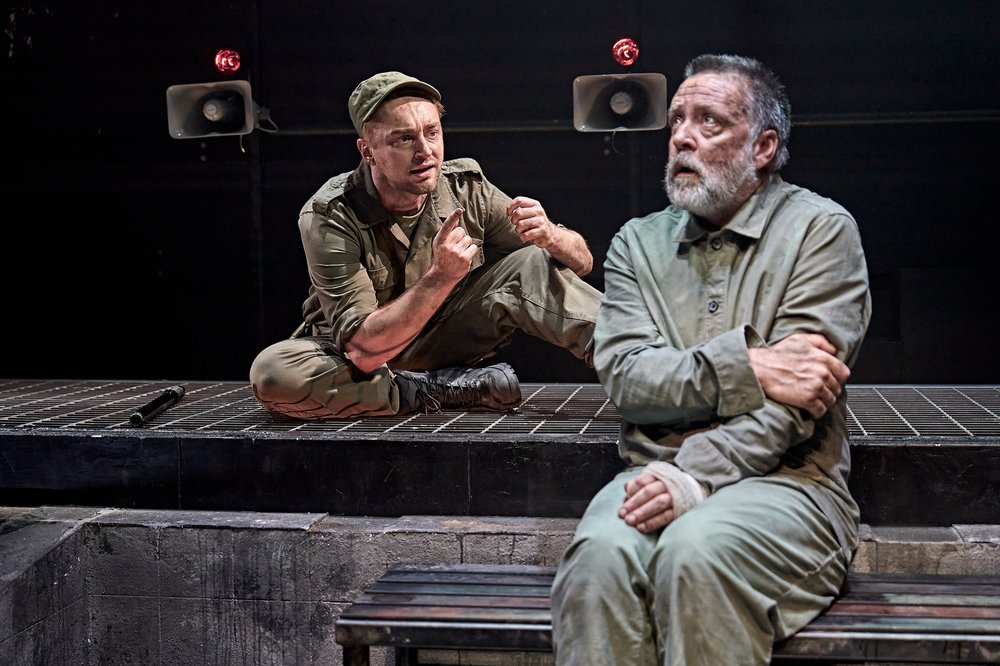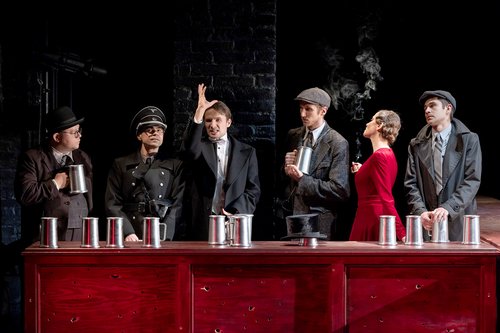The Unseen: Staging Political Captivity

The Unseen. Directed by Iya Patarkatsishvili. Ross Tomlinson (Smash) and Richard Harrington (Wallace). Riverside Studios. Photo courtesy: Manuel Harlan
In her new production of ‘The Unseen’ at the Riverside Studios in London, millennial director Iya Patarkatsishvili melds political oppression with existential inquiry within the bars of a Russian prison. Exploring faith, tyranny, and resilience, she sheds light on the silent struggles of political prisoners in our contemporary world.
Holding people hostage dates back historically to the earliest of military conflicts on our planet yet takes on a particularly sinister guise under totalitarian regimes who are adept at slapping punitive measures on their own citizens for the slightest expression of dissent, even when it may be nothing more than a private conversation. To legitimize these detentions, the authorities construct elaborate frameworks which form one of the pillars of tyranny: the corruption of law by a warped logic.
The plot of The Unseen takes place in one such police state (thinly veiled as today’s Russia), in a play which is a directorial debut for Iya Patarkatsishvili (b.1983). The setting is a state prison where two men are confined in an austere space shot through with an atmosphere of anguish: former GP Wallace, played by Richard Harrington and a former actor Valdez played by Waj Ali.
“The Unseen talks about the silent suffering endured by many in the world today. It is also a reminder of the experiences of innocent people who find themselves caught up in the contemporary gulags of Russia,” says Patarkatsishvili of her work. As an activist dedicated to human rights, with a special focus on the plight of political prisoners in Russia, such issues are not alien to Patarkatsishvili herself. She is the daughter of Georgian tycoon Arkady ‘Badri’ Patarkatsishvili, who amassed huge wealth in Russia in the 1990s, fell out with Vladimir Putin and moved to the UK in 2001 before dying some years later of sudden heart failure at the age of fifty-two.
Patarkatsishvili’s production is being staged at the Riverside Studios in West London until mid-December. It is a bold reimagining of a 2007 play by North American dramatist Craig Wright (b. 1965) originally commissioned by Hartford Stage as a play about Jesus Christ. Wright distilled the traditional story of Christ into a metaphysical encounter between two moral perspectives at the empty tomb, its stone rolled away, as a dialogue between faith and skepticism, that is, between the sensory and the rational. In Patarkatsishvili’s staged encounter, the two characters emerge as prisoners of both the regime and their respective belief systems.
Wallace and Valdez are held at opposite ends of a block of three cells, trapped also behind the walls of their own egos unable to transcend these manifold boundaries through either their own individual volition or through collaborating with one another. Between them yawns a tragic rupture which might otherwise harbors potential pathways to liberation. On one pivotal day, the blessed madman Valdez, having glimpsed the essence of the Absolute, attempts to share his revelation - simultaneously an escape plan - with his fellow inmate, yet finds himself unable to articulate this truth through any comprehensible words.
Facts usually keep a careful distance from parables, and what might manifest itself as divine in an allegory can be a brute power in reality. The stage of The Unseen has traded in its celestial deus ex machina for a servant of the repressive machinery in the guise of prison guard Smash played by Ross Tomlinson in kick ass jackboots. He layers physical pain on top of the emotional suffering of the prisoners, weaving fear into the air they breathe. His character arc emerges as driven by despair near the finale he flings open both cells, forcing the prisoners out to see each other for the first time accompanied by a monologue about his own moral qualms.
It seems that the key to understanding The Unseen, beneath its strong currents of anxiety and discomfort is not speculation about the cost of life or death but rather the presence of a persistent beating of hearts tormented at the hand of the cruel jailer, hearts which are never silenced. This speaks to the fundamental inability of any worldly force to extinguish feelings that are immortal through their universal presence, feelings that can always blossom in every human being.
If we view the theatre as an effigy of real lives, the portrayal in The Unseen of the reality of political prisoners emerges as somewhat spectral and idealistic (just look at Eugenia Ginzburg’s memoir ‘Into the Whirlwind’, among other such raw testimonies to taste the unvarnished truth). Representing this on the stage can never reach a level of authenticity yet, the work resists becoming entertainment, because it is anchored by Patarkatsishvili’s own political consciousness, her transparent conviction, and the emotional rawness of the performers on stage aided by selected theatrical devices like when the guard’s stick crashes against a metal bench in the cell after a moment of silence, the sound rippling outwards like the first thunderclap in a sky about to bruise.
On the walls leading to the auditorium at Riverside Studios is a temporary exhibition of photographs capturing actual prisoners in Russia’s oppressive regime, ‘Faces of Russian Resistance’. Here, opposition politicians share the wall space with portraits of ordinary people - a firefighter, a schoolteacher, and many other anonymous people whose sole crime has been daring to question the official doctrine. “My intention was to challenge the myth that every political prisoner must be a figure like Nelson Mandela. A political prisoner is not necessarily someone who chose to risk their life and freedom for a political stand,” says Patarkatsishvili, encouraging us to learn about the real innocent lives locked behind bars today.
There are many inexplicable things happening across the world now, yet history does not repeat itself; it suffers from chronic amnesia. Perhaps it is only art that can function as a sort of collective mnemonic for humanity, a memory-pill that cannot be fully digested. If art crystallizes truth, or at least strives toward it then surely the contours of our future will be carved out with a keener sense of justice.














